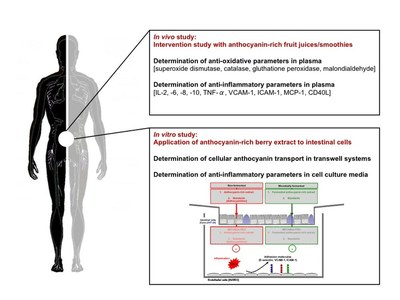Teilprojekt 4 - Anthocyane und Metabolite
Anthocyane und Metabolite – antioxidative und antiinflammatorische Wirksamkeit in vitro und in vivo
Work package 4:
Anthocyanins and metabolites – anti-oxidative and anti-inflammatory effects in vitro and in vivo.
Project team: Prof. Dr. S. Rudloff, Dr. S. Kuntz, FB 09 und FB 11, JLU
Email: silvia.rudloff@ernaehrung.uni-giessen.de; sabine.kuntz@ernaehrung.uni-giessen.de
Background
Berry anthocyanins have been linked to beneficial health effects, mainly in chronic diseases by their anti-oxidative and anti-inflammatory capacity. The effects of anthocyanins on anti-oxidative and anti-inflammatory responses are less well known and most of the studies are performed in vitro showing the modulatory effects of single non-metabolized components. However, these in vitro effects from isolated substances cannot be extrapolated to an in vivo situation. It must be taken into account that microbial fermentation and intestinal metabolization may lead to further metabolites with different biological effects.
Aims
The aims of this project are (1) to establish in vitro models for microbial fermentation model as well as a co-culture-model (intestinal and endothelial cells), (2) to assess the amount of anthocyanins, degradation products and their metabolites during microbial fermentation and transport through the intestinal layer, (3) to compare the anti-inflammatory and anti-oxidative effects of anthocyanin rich extracts before and after microbial fermentation in vitro; (4) to identify cellular targets affected by anthocyanins and their metabolites (signal transduction and protein synthesis) and (5) to determine the anti-oxidative capacity, the amount of soluble mediators as well as inflammatory markers in in vivo samples deriving from a human intervention study (see work package 6)

